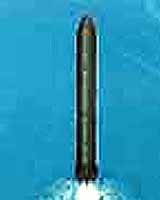 Air Force Switches To Dual Production of EELV
Air Force Switches To Dual Production of EELV
Washington DC - Nov 8 , 1997 -
 Washington DC - Nov 8 , 1997 - The U.S. Air Force confirmed
Friday it had decided to restructure the Evolved Expendable Launch Vehicle (EELV) program and would buy rockets from both Boeing and Lockheed Martin instead of awarding a single production contract next summer. The decision means that both the advanced Delta III and IV designs, as well as the advanced Atlas IIAR, would likely remain in production well into the 21st century. But both rocket makers, once competitors for the juicy multi-billion contract, would still have to compete on a bid-per-launch basis, as well as fund the development cost of their respective launchers.
Washington DC - Nov 8 , 1997 - The U.S. Air Force confirmed
Friday it had decided to restructure the Evolved Expendable Launch Vehicle (EELV) program and would buy rockets from both Boeing and Lockheed Martin instead of awarding a single production contract next summer. The decision means that both the advanced Delta III and IV designs, as well as the advanced Atlas IIAR, would likely remain in production well into the 21st century. But both rocket makers, once competitors for the juicy multi-billion contract, would still have to compete on a bid-per-launch basis, as well as fund the development cost of their respective launchers.
The EELV was the last big military space contract of the 20th century. The
Air Force decision was believed heavily influenced by industrial base
issues, as the loser under the original scenario would have, in essence,
been driven from the launch business in the winner-take-all structure. It
was also believed that the different design features of both firm's
configurations each had merit, under the Air Force's pre-Engineering and
Manufacturing Development (EMD) review, underway since last December, when
the military chose the two companies as the finalists.
But exactly how the Air Force will achieve its 25 to 50% reduction in
launch costs by sustaining two companies along the military launch route
isn't clear. What is clear, however, is that both rocket families will need
plenty of commercial customers to be truly viable. The EELV program was
announced in 1994 as a plan to replace the existing Delta, Atlas, and Titan
rocket families with an all-new expendable fleet, drastically reducing the
cost of sending military satellites into space. First launch of the medium
vehicle prototype is planned for 2002, with full operational capability by
2006.
Related Links
 Ukraine and Russia forge new launch contract
Ukraine and Russia forge new launch contract
 Washington, DC Nov. 8, 1997 -
Washington, DC Nov. 8, 1997 -
 Washington, DC Nov. 8, 1997 - A new joint venture to sell converted former Soviet SS-18 ballistic missiles as commercial smallsat boosters was signed today, the Interfax News Agency reported from Moscow. Interfax quoted the head of the Ukrainian National Space Agency, Alexander Negota, as saying the deal was a 50-50 venture of the Yuzhnoye and Yuzhmash design bureaus, as well as other rocket engine and component makers, equally from both nations. Washington, DC Nov. 8, 1997 - A new joint venture to sell converted former Soviet SS-18 ballistic missiles as commercial smallsat boosters was signed today, the Interfax News Agency reported from Moscow. Interfax quoted the head of the Ukrainian National Space Agency, Alexander Negota, as saying the deal was a 50-50 venture of the Yuzhnoye and Yuzhmash design bureaus, as well as other rocket engine and component makers, equally from both nations.
|
 |
|

 Washington DC - Nov 8 , 1997 - The U.S. Air Force confirmed
Friday it had decided to restructure the Evolved Expendable Launch Vehicle (EELV) program and would buy rockets from both Boeing and Lockheed Martin instead of awarding a single production contract next summer. The decision means that both the advanced Delta III and IV designs, as well as the advanced Atlas IIAR, would likely remain in production well into the 21st century. But both rocket makers, once competitors for the juicy multi-billion contract, would still have to compete on a bid-per-launch basis, as well as fund the development cost of their respective launchers.
Washington DC - Nov 8 , 1997 - The U.S. Air Force confirmed
Friday it had decided to restructure the Evolved Expendable Launch Vehicle (EELV) program and would buy rockets from both Boeing and Lockheed Martin instead of awarding a single production contract next summer. The decision means that both the advanced Delta III and IV designs, as well as the advanced Atlas IIAR, would likely remain in production well into the 21st century. But both rocket makers, once competitors for the juicy multi-billion contract, would still have to compete on a bid-per-launch basis, as well as fund the development cost of their respective launchers. Washington, DC Nov. 8, 1997 -
Washington, DC Nov. 8, 1997 -  Washington, DC Nov. 8, 1997 - A new joint venture to sell converted former Soviet SS-18 ballistic missiles as commercial smallsat boosters was signed today, the Interfax News Agency reported from Moscow. Interfax quoted the head of the Ukrainian National Space Agency, Alexander Negota, as saying the deal was a 50-50 venture of the Yuzhnoye and Yuzhmash design bureaus, as well as other rocket engine and component makers, equally from both nations.
Washington, DC Nov. 8, 1997 - A new joint venture to sell converted former Soviet SS-18 ballistic missiles as commercial smallsat boosters was signed today, the Interfax News Agency reported from Moscow. Interfax quoted the head of the Ukrainian National Space Agency, Alexander Negota, as saying the deal was a 50-50 venture of the Yuzhnoye and Yuzhmash design bureaus, as well as other rocket engine and component makers, equally from both nations.